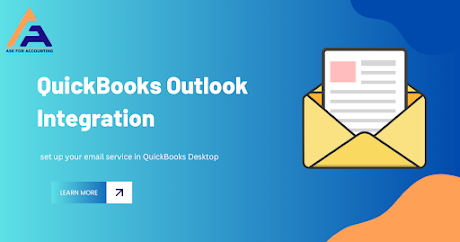In the fast-paced world of business, efficiency is key to staying competitive and managing your time effectively. QuickBooks and Microsoft Outlook are two indispensable tools that many businesses use to streamline financial management and communication. When these two powerful platforms are seamlessly integrated, it can significantly enhance productivity and provide a range of benefits that help businesses thrive.
QuickBooks is renowned for its accounting and financial management capabilities, while Microsoft Outlook is the go-to email and communication platform for millions of professionals worldwide. In this article, we will explore the numerous advantages of setup email in QuickBooks and how it can transform the way businesses operate.
Advantages of Integrating QuickBooks with Microsoft Outlook

- Streamlined Communication
One of the most significant advantages of connecting QuickBooks with Outlook is the ability to streamline communication. With this integration, you can easily share invoices, purchase orders, and financial statements directly from QuickBooks to your Outlook email, facilitating efficient communication with clients, suppliers, and colleagues. This eliminates the need to manually send attachments or switch between different platforms, saving valuable time and reducing the risk of errors.
- Improved Customer Relationships
In today's competitive business landscape, maintaining strong customer relationships is paramount. The integration of QuickBooks and Outlook can help enhance your interactions with clients by providing a comprehensive view of their financial history and transactions. This real-time access to customer data enables you to provide better service, respond to inquiries promptly, and even set up automated payment reminders, which can improve cash flow and customer satisfaction.
- Enhanced Time Management
Time is money, and the integration of QuickBooks and Outlook can help businesses save a substantial amount of it. By eliminating the need to manually input financial data into emails, calendar appointments, or tasks, you can significantly reduce administrative overhead and ensure that important financial information is readily accessible. This, in turn, allows you to focus on core business activities and make more informed decisions based on real-time data.
- Accurate Financial Reporting
Integrating QuickBooks with Microsoft Outlook also contributes to more accurate financial reporting. The system ensures that all financial documents, invoices, and receipts are securely stored and readily accessible. This means that you can generate financial reports with confidence, reducing the likelihood of errors or discrepancies. This is especially valuable for tax preparation, audits, and financial planning.
- Cost Savings
By reducing manual data entry and administrative tasks, QuickBooks and Outlook integration can result in significant cost savings. You can optimize your workforce, reduce the risk of human error, and lower the overall operating costs of your business. Additionally, the improved efficiency can allow your team to handle a higher volume of work, which can lead to increased profitability.
- Enhanced Security
Security is a top concern for businesses, especially when handling financial data. QuickBooks and Microsoft Outlook are known for their robust security features, and by integrating the two platforms, you can create a secure environment for your financial data. Access to financial documents can be controlled, and data is protected with encryption and access controls, ensuring that sensitive information remains confidential.
Conclusion
The integration of QuickBooks and Microsoft Outlook is a powerful combination that offers a myriad of benefits to businesses of all sizes. It enhances communication, strengthens customer relationships, streamlines processes, improves accuracy, and ultimately saves time and money. By bringing together the financial management capabilities of QuickBooks with the communication prowess of Microsoft Outlook, businesses can operate more efficiently and effectively, making them better equipped to face the challenges of the modern business world. If you haven't already explored this integration, it's time to consider how it can transform the way you manage your finances and communicate with your stakeholders.
